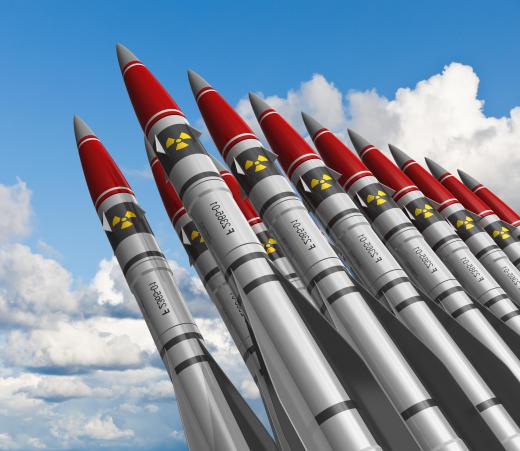What is a Nuclear Breeder Reactor?
 Michael Anissimov
Michael Anissimov
A breeder reactor is a type of nuclear specifically designed to create more fissile material (nuclear fuel) than it consumes. Depending on the Breeding Ratio of a reactor, it can produce new fuel at a greater or lesser rate. The Breeding Ratio represents the number of new fissile atoms created for each fission event. The theoretical upper limit for the Breeding Ratio is 1.8, while most breeder reactors are designed to produce just about as much fissile material as they consume. It is hoped that breeder reactors will replace the current generation of conventional reactors as progress in nuclear power continues.
Most traditional nuclear reactors create some additional fuel as they operate, increasing fuel efficiency. As the nuclear industry has developed, these ratios have been pushed higher and higher, leading to better fuel economies. There are still technical hurdles to developing cost-effective breeder reactors, but breeders can claim a number of advantages that traditional reactors can’t. The greatest is that, after an initial loading of enriched uranium or plutonium, a breeder reactor can thereafter be powered just by periodic loadings of unenriched (natural) uranium or (in another type of breeder reactor) thorium. Thorium is about four times more abundant in the Earth’s crust than uranium, poses very little weaponization risk, and produces nuclear waste which decreases in intensity to background levels much quicker than the waste from a conventional plant.

One concern with breeder reactors is that by producing bomb-ready nuclear fuel, such as plutonium, they create a nuclear weapons risk. This problem is addressed by a stage in nuclear preprocessing where other elements such as curium and neptunium are added in tiny quantities to the plutonium. This form of processing has no effect on the use of plutonium as a reactor fuel, but makes it extremely difficult to use the material to create an atomic bomb, even if utilizing a very sophisticated design.

There are two types of breeder reactors that have been proposed. The first, the fast breeder reactor, uses an initial fuel charge of plutonium, thereafter only requiring natural uranium for energy. A few prototypes have been built of fast breeders, and Japan, China, Korea, and Russia are all committing funds towards continued development. The second type of breeder reactor is a thermal breeder reactor, which uses an initial fuel charge of enriched uranium, thereafter using only thorium. Thermal breeder reactors have only been built on a small scale thus far, with India taking the first steps towards industrial-scale development, having begun in 2006.
AS FEATURED ON:
AS FEATURED ON:












Discussion Comments
They are safe, not in japan because of natural disasters being a huge threat over there. You need not worry. They are the future of energy production and that is a great thing.
@parmnparsley- I sat in on a presentation by a physicist about the nuclear industry a few days ago and he said there are serious concerns amongst industry experts concerning the lack of investment and education. Because of the lack of new permits for plants, extensions are being granted for old plants, resulting in an aging infrastructure with half of the country’s nuclear plants over 20 years old. Colleges are merging or eliminating nuclear engineering programs in favor of nuclear medicine programs; one of the only areas where significant investment in nuclear exists.
The entire framework of the nuclear power industry is slowly deteriorating because there is a lack of skilled engineers, antiquated plants operating beyond their planned operational period, and a lack of new plants being built. There is also nowhere to store the radioactive waste so it is all stored on site. Because of the lack of investment in the industry, the current nuclear reactors are mostly old, inefficient reactors that are not as safe as the new reactors available.
What can we do to make nuclear energy safer? Watching the disaster in Japan unfold has me a little nervous about the current state of our nuclear power industry. Do we have the ability to prevent a similar disaster in a breeder reactor in this country? What about in a place like France where most of their energy comes from nuclear power, can they manage a similar disaster?
Post your comments